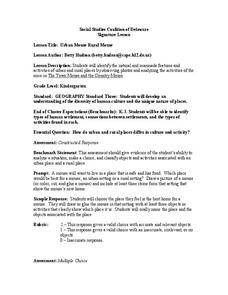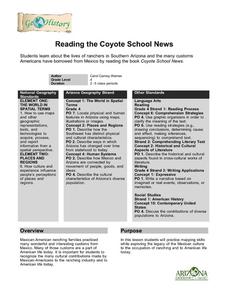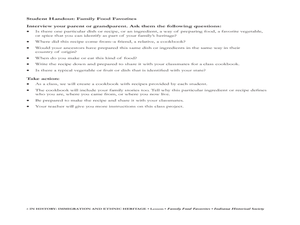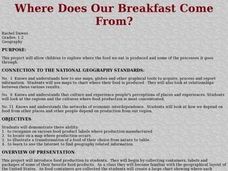Texas Education Agency (TEA)
Managers and Cultural Diversity
Let's get down to business. Pupils read a variety of business scenarios and identify appropriate managerial styles for each conflict. Additionally, scholars create a cultural diversity word collage.
Curated OER
Quilting
Second graders make a quilt. In this cultural diversity lesson, 2nd graders review their knowledge of the Metis people. Students work in groups to create a class quilt that illustrates the lives of these people. Quilt themes include...
Curated OER
Stress Factors and Careers
Ninth graders explore factors that cause stress. They identify stress factors and how to deal with them. They role-play differences in cultures and equity issues and how they are affected by them. They record stresses they have and rate...
Curated OER
One Step at a Time
Young scholars investigate the customs and habits of other cultures by reading letters from a Peace Corps Volunteer. In this global customs lesson plan, students discuss how analyzing a culture is similar to analyzing art, no two people...
PBS
Latino Americans Share Their Experiences
Three Latino Americans are the focus of an interactive that spotlights their accomplishments. Scholars get to know Lin-Manuel Miranda, Judy Reyes, and José Hernández through short informative text and videos. Participants read, take...
Agriculture in the Classroom
A Rafter of Turkeys
How did that turkey get from the early Aztec culture to your table? Learn about the history of wild and domesticated turkeys in North America, as well as their inclusion in Thanksgiving traditions, with a two-part agricultural science...
Social Studies Coalition of Delaware
Urban Mouse Rural Mouse
Explore rural and urban environments over the course of four days. Each day offers a new look into how both environment compare and contrast. Activities include the observation and analyzation of images, a read aloud and grand discussion...
Curated OER
Reading the Coyote School News: Lives of Ranchers in Southern Arizona
Fourth graders examine the effects of Mexican-American ranching on life today.
Curated OER
Entertainment During the American Revolution
What do people do for fun around here? Explore colonial period games, toys, and life with a look at entertainment during the American Revolution. Discover the games, sports, and songs that were popular during the time of the Revolution.
Curated OER
Family Food Favorites
Third graders conduct an interview and create a class cookbook. In this family heritage lesson, 3rd graders read Everybody Bakes Bread and discuss a dish or recipe that is a part of their family's heritage. Students interview family...
Curated OER
Where Does Our Breakfast Come From?
Students bring in the cartons and containers of some of their favorite foods. They locate the origin of these foods on a map and visit a farm to view how food is grown and processed by a farmer. Students read books, complete worksheets...
Curated OER
Through Many Lenses: How are Countries Depicted by the Media?
If you plan to utilize the ABC miniseries, "The Path to 9/11" in your classroom, consider incorporating media literacy and research skills. After (or while) learners view the series, they discuss ways information can differ from source...
Curated OER
What I Did On My Summer Vacation
Students use the internet to research the location of their summer vacation trip. Given the demographics, they plot the location on a world map. They create a brochure using the information they collected. Using PowerPoint, they develop...
Curated OER
Literacy & Art: The Story behind the Quilt
Students examine the many ways quilts were used to chronicle the history and experiences of African slaves and African-Americans in America. They analyze a story quilt using the elements of storytelling, then create a class quilt.
Curated OER
Anasazi Pueblo Period: 700-1050 A.D.
Sixth graders investigate the main ideas and information about the Developmental Pueblo period, from 700-1050 A.D., of the Anasazi.
Curated OER
Anasazi Basket Weaving: 500-700 A.D.
Sixth graders examine the main ideas and information about the Modified Basket Maker Period 500-700 A.D. of the Anasazi.

















